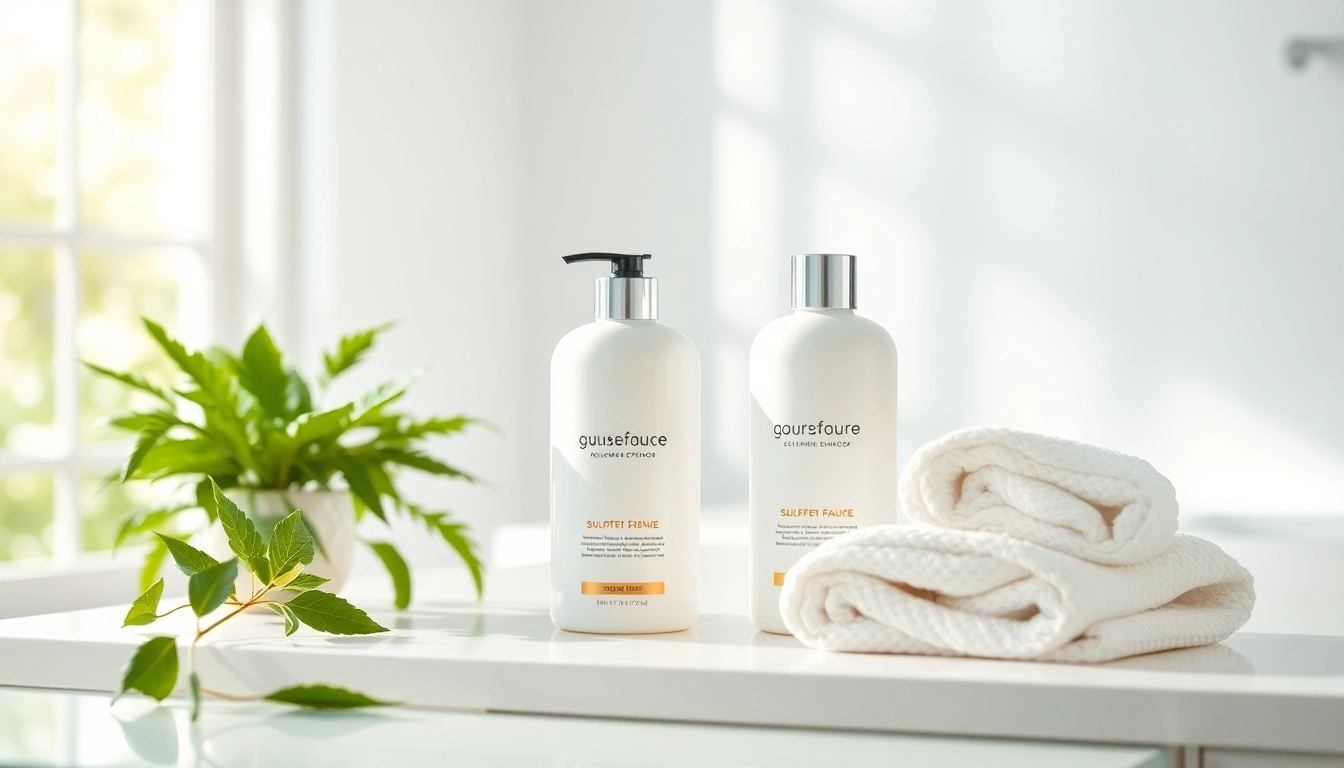Understanding Sulfate Free Shampoo
What is Sulfate Free Shampoo?
Sulfate free shampoo has gained immense popularity in recent years as consumers become more aware of the ingredients they use in their personal care products. But what exactly is sulfate free shampoo? In simple terms, this type of shampoo is formulated without sulfates, which are powerful cleansing agents often found in many conventional hair care products. Sulfates are surfactants that help to create lather and remove dirt, oil, and product buildup from the hair. However, they can also strip the hair of its natural moisture, leading to dryness, frizz, and damage, particularly for those with colored or treated hair.
By opting for sulfate free shampoo, consumers are choosing a gentler option that still cleanses effectively without the harsh side effects. Sulfate free shampoos typically rely on milder surfactants, along with nourishing ingredients that help maintain the hair’s natural moisture balance.
Benefits of Using Sulfate Free Products
Switching to sulfate free shampoo can produce a range of benefits, making it a worthwhile investment for anyone looking to improve their hair care routine. Here are some key advantages:
- Retains Natural Oils: Sulfate free shampoos help maintain the natural oils produced by the scalp, which keeps hair hydrated and healthy. This is particularly beneficial for individuals with dry or textured hair.
- Less Damage to Color: For those who dye their hair, sulfate free options can help preserve the vibrancy of color-treated locks, as they are less likely to strip away the color, leading to longer-lasting hues.
- Reducing Irritation: Many individuals find that traditional shampoos can cause scalp irritation or itching. The gentler surfactants in sulfate free shampoos make them suitable for sensitive skin types.
- Improved Texture and Shine: Users often report softer, shinier hair after switching to sulfate free formulas, as they nourish the hair without stripping away essential moisture.
- Environmentally Friendly: Many brands that offer sulfate free shampoos also focus on other natural ingredients and eco-friendly practices, which can appeal to environmentally conscious consumers.
Common Myths about Sulfates
With the rise in popularity of sulfate free products, several myths have emerged that need to be addressed. Here are some common misconceptions about sulfates:
- All Sulfates Are Bad: Not all sulfates are created equal. While sodium lauryl sulfate (SLS) is the most common sulfate associated with hair damage, there are other sulfates that are less harsh and might be safe for certain hair types.
- Sulfate Free Means No Cleansing: Another myth is that sulfate free shampoos do not cleanse the hair effectively. In reality, sulfate free formulas are effective cleansers that simply use milder alternatives, making them gentler on hair and scalp.
- Only Individuals with Problems Should Use Sulfate Free: Many people think sulfate free products are only necessary for those with dry or damaged hair. In reality, anyone can benefit from these gentler formulations, regardless of hair type.
Choosing the Right Sulfate Free Shampoo
Identifying Your Hair Type
Choosing the right sulfate free shampoo begins with understanding your hair type. Hair types can vary widely, influenced by factors such as texture, density, porosity, and scalp condition. For example, fine hair may require a lightweight formula to avoid weighing it down, while curly hair thrives on moisture-rich shampoos that help define curls without stripping them of essential oils.
Consider your individual needs:
- Straight Hair: Often benefits from volumizing sulfate free shampoos that clean without weighing the hair down.
- Curly Hair: Needs hydrating formulas that help lock in moisture and maintain curl definition.
- Color-Treated Hair: Should look for sulfate free shampoos specifically formulated for preserving color.
- Oily Hair: Might prefer a balancing formula that can gently remove excess oil while still being sulfate free.
- Textured Hair: Requires rich, nourishing ingredients to enhance moisture content and ease curl management.
Ingredients to Look For
When selecting a sulfate free shampoo, paying attention to the ingredient list is vital. Here are some key ingredients to seek out:
- Coconut Oil: Provides hydration and helps reduce frizz.
- Aloe Vera: Known for its soothing properties and hydration, beneficial for both scalp and hair.
- Shea Butter: Provides deep conditioning, ideal for moisturizing dry hair.
- Plant-Based Surfactants: Ingredients like decyl glucoside and lauryl glucoside offer gentle cleansing without harsh effects on hair.
- Essential Oils: Oils like lavender or tea tree not only add a pleasant fragrance but also can contribute to scalp health.
Top Brands and Products
As the demand for sulfate free shampoos grows, a variety of brands have emerged in the market, each with its unique selling points. Here are some of the top brands known for their sulfate free formulations:
- SheaMoisture: This brand offers a variety of sulfate free shampoos enriched with natural ingredients, tailored for specific hair types, including curly and coily textures.
- Briogeo: Known for their “Clean” ethos, Briogeo has developed a range of sulfate free hair care products that are effective and gentle.
- Redken: Their sulfate free options deliver professional-grade performance, particularly for color-treated hair.
- Living Proof: Their shampoos are formulated with patented technologies to combat various hair concerns.
- Moroccanoil: Well-regarded for their nourishing oil-infused shampoos that boost hydration without sulfates.
How to Shine with Sulfate Free Hair Care
Implementing a New Hair Care Routine
Transitioning to a sulfate free hair care routine can be a game-changer for many individuals. Here are some essential steps to implement:
- Gradual Transition: If you’re switching from a sulfate-heavy shampoo, consider tapering down use to allow your scalp and hair to adjust to the new product.
- Shampoo Less Frequently: Many people find that they don’t need to wash their hair as often when using sulfate free shampoos, as they can be less stripping. This can lead to healthier, shinier hair.
- Focus on Nourishing Ingredients: Pair your sulfate free shampoo with conditioners and treatments that contain hydrating, natural ingredients.
- Follow Up with Regular Treatments: Incorporating weekly hair masks or treatments tailored to your hair type can further enhance results.
Complementary Products for Best Results
To maximize the benefits of sulfate free shampoo, it’s essential to use complementary products. Here are some suggestions:
- Sulfate Free Conditioner: Always use a sulfate free conditioner that matches your shampoo to retain moisture and improve manageability.
- Hair Masks: Look for deep conditioning hair masks that can provide extra nourishment if your hair still feels dry or brittle.
- Leave-In Conditioner: A leave-in conditioner can provide additional moisture and protection from heat styling and environmental stressors.
- Styling Products: Use sulfate free styling products that won’t strip your hair but will help you achieve your desired look.
Hair Care Tips for Vibrant Locks
To ensure your hair remains vibrant and healthy when using sulfate free products, consider these additional tips:
- Adjust Water Temperature: Washing your hair with lukewarm or cool water can help close the hair cuticles and retain moisture.
- Limit Heat Styling: Try to reduce the use of heat styling tools, or ensure you’re using a heat protectant to minimize damage.
- Regular Trims: Cutting off split ends regularly helps maintain hair health and appearance.
- Lifestyle Factors: Maintain a healthy diet rich in vitamins and minerals, as internal nutrition significantly impacts hair health.
FAQs About Sulfate Free Shampoo
Is Sulfate Free Shampoo Suitable for Everyone?
Yes, sulfate free shampoo can be suitable for everyone, regardless of hair type or condition. It can be particularly beneficial for those with sensitive scalps, color-treated hair, or naturally dry or curly locks. While some individuals with very oily scalps might prefer a stronger cleansing agent, many find they can still enjoy the benefits of sulfate free formulas.
Can I Use Sulfate Free Shampoo on Colored Hair?
Absolutely! In fact, sulfate free shampoo is often recommended for color-treated hair. Because it does not contain harsh sulfates that can strip color, it helps maintain the vibrancy and longevity of hair dye while keeping hair nourished.
How Often Should I Wash My Hair?
The frequency of washing hair depends largely on your hair type and lifestyle. Those with oily hair might find they need to wash more often, while those with dry or curly hair may benefit from less frequent washing. A good rule of thumb is to wash your hair every 2-4 days, observing how your hair and scalp respond to find the right balance.
Real User Experiences and Recommendations
Transformative Stories: Users Share Their Results
Real user experiences add valuable insights into how sulfate free shampoo can transform hair health. Many users report significant improvements in their hair’s appearance and texture after making the switch. For instance, a user with previously lifeless, dry hair noted that after using a sulfate free product, her hair became bouncier, shinier, and more manageable.
Expert Opinions on Sulfate Free Care
Experts in the field, including dermatologists and hair care professionals, often recommend sulfate free shampoos for their gentler composition. Many highlight that they not only prevent the over-drying associated with traditional shampoos but also promote overall hair health. Hair care professionals advocate for customization based on hair types, emphasizing that while sulfate free is a great choice, individual needs should guide product selection.
Comparing User Experiences Across Brands
User experiences can differ greatly across brands offering sulfate free shampoos. Some may prefer the lightweight feel and scent of one brand over another. By sharing stories, users provide valuable feedback that helps potential buyers make informed decisions. For instance, while some users rave about the hydration levels of a particular brand, others may argue that a different brand offers better volume. Understanding these experiences allows consumers to better tailor their purchases to suit their personal hair-care needs.



